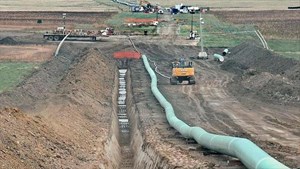Feds allow Dakota Access to stay online during environmental study
(Bloomberg) --A federal district court won’t force the Dakota Access pipeline to shut down while federal regulators conduct a new environmental analysis.
The pipeline at the center of a years-long battle between oil companies and the Standing Rock Sioux tribe may remain in service even though it lacks a valid federal easement for a water crossing in North Dakota, the U.S. District Court for the District of Columbia said Friday. The pipeline’s easement was scrapped in an earlier court ruling for inadequate environmental review.
The ruling, which may be appealed, is a relief for operator Energy Transfer LP, which has faced an unending stream of legal threats to Dakota Access since 2016. It’s also seen as a rare victory for the pipeline industry as a whole amid rising opposition from environmental watchdogs and activists over the past few years.
However, it’s a discouraging loss for the Standing Rock Sioux Tribe and other Indigenous opponents of the pipeline -- already reeling after the Biden administration announced April 9 that it wouldn’t order a shutdown.
“We are pleased the court correctly recognized that the continued operation of the Dakota Access pipeline presents no risk of harm to others and appropriately denied the efforts to shut down this vitally important pipeline,” Energy Transfer said in an emailed statement.
But government officials could change their minds, leaving some lingering threat for Dakota Access, according to James Coleman, an energy law professor at Southern Methodist University. “It’s not a comfortable position, but it’s a lot more comfortable than it was yesterday,” he said of the pipeline’s status.
High Bar
The Dakota Access pipeline, also used by operators such as Continental Resources Inc., has been shipping oil from North Dakota’s Bakken oil field to Illinois for four years.
Judge James Boasberg determined the tribes hadn’t met the high bar for shutting down the pipeline under a legal standard set out by a federal appeals court last year.
“Whether framed in terms of likelihood or imminence, Plaintiffs have not made a successful showing of irreparable harm based on the threat of an oil spill at Lake Oahe,” the judge wrote, referring to the body of water the pipeline crosses near tribal land.
Boasberg scolded the Biden administration for refusing to take a clear stance on the pipeline. The Army Corps of Engineers declined to shut it down, but also failed to formally approve its ongoing operation without an easement.
The Army Corps has said it expects to finish a court-ordered environmental impact statement for the project in spring 2022.
Earthjustice lawyer Jan Hasselman, who represents Standing Rock, said the tribe will continue to press the Army Corps to closely review the project’s risks.
“The unacceptable risk of an oil spill, impacts to Tribal sovereignty and harm to drinking water supply must all be examined thoroughly in the months ahead as the U.S. Army Corps conducts its review of this pipeline,” he said in a statement Friday.
‘Free of Political Pressure’
He declined to comment on the next steps in the case, including whether the tribes will pursue an appeal.
Pipeline opponents could also raise a separate “Hail Mary play” under the Administrative Procedure Act targeting the Army Corps’ inaction, said Christi Tezak, analyst at ClearView Energy Partners, in a note to clients Friday.
Energy Transfer reversed early losses and jumped as much as 2.7% following the news. The stock settled up 1.7% in New York. Phillips 66 Partners, which owns a minority stake in the project, gained 6.3% at the close.
Energy Transfer didn’t immediately respond to a request for comment. The Army Corps referred questions to the Justice Department, which didn’t immediately respond.
“We hope that the administrative process is allowed to move forward allowing the Army Corps of Engineers to complete its work -- free of political pressure,” said Craig Stevens, head of the pro-pipeline GAIN Coalition, in a statement.



